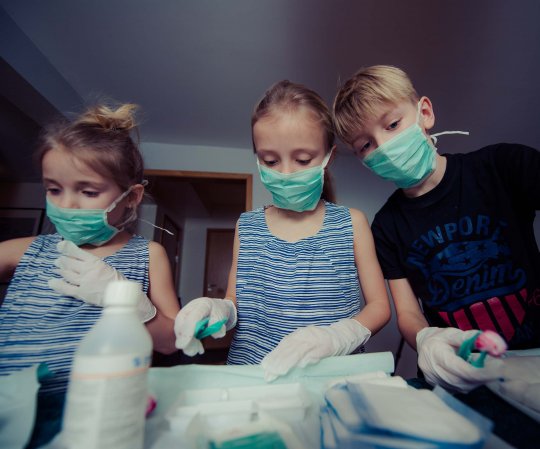Family health campaign. How to take care of it at this particular time?

What does taking care of yourself mean?
Ask your child to name different categories of taking care of yourself. Together, make a list of what constitutes: healthy eating (maybe not just vegetables and fruits, but also dietary diversity); hygiene (from washing hands and teeth to wearing clean clothes); resilience (toughening up and maintaining good physical condition); health (from vaccination, through seeing a dentist, to avoiding smog); rest (regularity of sleep and ways to relax); development (of your interests and learning). Tell your child why this is important to you. And how do they see it?
It may also be a good idea to create an information campaign entitled “How to take care of yourself?”. You could prepare posters or a nursery rhyme. Or direct a film. Or deliver a short lecture and have the child do a presentation for the family. Together with your child, you might find inspiration in a letter and photos depicting the story of an 8-year-old from Indonesia, who tells his peers why taking care of himself is important to him.
Family campaign
Together, choose the issues that are the most important for you now and prepare your campaign. Perhaps how to take care of hygiene and strengthen the immune system? Or perhaps how to ensure self-development while staying home? Once your campaign is ready, use it to raise awareness among family and friends. Why don’t you share your campaigns with others? After all, it’d be good for us to look after each other!
Psychological well-being
Health, as defined by the World Health Organisation, is not just the complete absence of disease or disability, but above all, full physical, mental and social well-being. It can be difficult to maintain in the pandemic, especially as it’s an inevitable threat to our health. Let’s try not to avoid this topic and not leave children alone with their unspoken fears. Let your child, but also other household members, express what they feel and share their fears, however irrational they might seem to you. Do not judge their fears and thoughts, talk to them about the emotions these fears and thoughts evoke in them. What can help them (and you) maintain their relative well-being in this situation? Together, look for solutions available to you in the current circumstances.
All source materials are prepared by the team of Kulczyk Foundation’s Education Department in cooperation with teachers and experts – pedagogists, psychologists and cultural experts – and verified by an experienced family therapist Kamila Becker. Kinga Kuszak, PhD, Professor of Adam Mickiewicz University, Faculty of Educational Studies, provides content-related supervision over Kulczyk Foundation’s educational materials. All materials are covered by the content patronage of the Faculty of Educational Studies of Adam Mickiewicz University.
The article was published on 07.04.2020 on the website of Instytut Dobrego Życia (Good Life Institute)
Authors: Dorota Szkodzińska (Kulczyk Foundation) and Anna Woźniak (Instytut Dobrego Życia)

